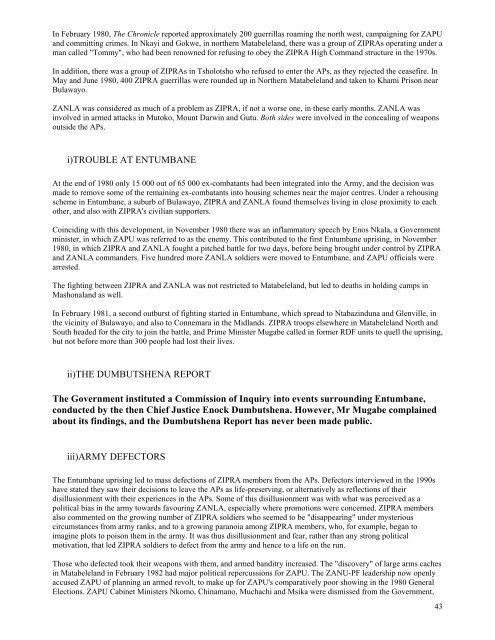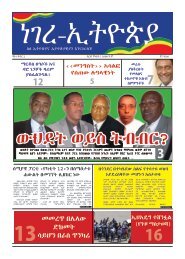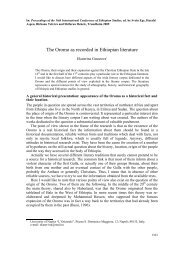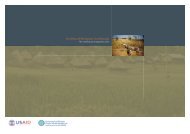MatabelelandReport
MatabelelandReport
MatabelelandReport
Create successful ePaper yourself
Turn your PDF publications into a flip-book with our unique Google optimized e-Paper software.
In February 1980, The Chronicle reported approximately 200 guerrillas roaming the north west, campaigning for ZAPU<br />
and committing crimes. In Nkayi and Gokwe, in northern Matabeleland, there was a group of ZIPRAs operating under a<br />
man called "Tommy", who had been renowned for refusing to obey the ZIPRA High Command structure in the 1970s.<br />
In addition, there was a group of ZIPRAs in Tsholotsho who refused to enter the APs, as they rejected the ceasefire. In<br />
May and June 1980, 400 ZIPRA guerrillas were rounded up in Northern Matabeleland and taken to Khami Prison near<br />
Bulawayo.<br />
ZANLA was considered as much of a problem as ZIPRA, if not a worse one, in these early months. ZANLA was<br />
involved in armed attacks in Mutoko, Mount Darwin and Gutu. Both sides were involved in the concealing of weapons<br />
outside the APs.<br />
i)TROUBLE AT ENTUMBANE<br />
At the end of 1980 only 15 000 out of 65 000 ex-combatants had been integrated into the Army, and the decision was<br />
made to remove some of the remaining ex-combatants into housing schemes near the major centres. Under a rehousing<br />
scheme in Entumbane, a suburb of Bulawayo, ZIPRA and ZANLA found themselves living in close proximity to each<br />
other, and also with ZIPRA's civilian supporters.<br />
Coinciding with this development, in November 1980 there was an inflammatory speech by Enos Nkala, a Government<br />
minister, in which ZAPU was referred to as the enemy. This contributed to the first Entumbane uprising, in November<br />
1980, in which ZIPRA and ZANLA fought a pitched battle for two days, before being brought under control by ZIPRA<br />
and ZANLA commanders. Five hundred more ZANLA soldiers were moved to Entumbane, and ZAPU officials were<br />
arrested.<br />
The fighting between ZIPRA and ZANLA was not restricted to Matabeleland, but led to deaths in holding camps in<br />
Mashonaland as well.<br />
In February 1981, a second outburst of fighting started in Entumbane, which spread to Ntabazinduna and Glenville, in<br />
the vicinity of Bulawayo, and also to Connemara in the Midlands. ZIPRA troops elsewhere in Matabeleland North and<br />
South headed for the city to join the battle, and Prime Minister Mugabe called in former RDF units to quell the uprising,<br />
but not before more than 300 people had lost their lives.<br />
ii)THE DUMBUTSHENA REPORT<br />
The Government instituted a Commission of Inquiry into events surrounding Entumbane,<br />
conducted by the then Chief Justice Enock Dumbutshena. However, Mr Mugabe complained<br />
about its findings, and the Dumbutshena Report has never been made public.<br />
iii)ARMY DEFECTORS<br />
The Entumbane uprising led to mass defections of ZIPRA members from the APs. Defectors interviewed in the 1990s<br />
have stated they saw their decisions to leave the APs as life-preserving, or alternatively as reflections of their<br />
disillusionment with their experiences in the APs. Some of this disillusionment was with what was perceived as a<br />
political bias in the army towards favouring ZANLA, especially where promotions were concerned. ZIPRA members<br />
also commented on the growing number of ZIPRA soldiers who seemed to be "disappearing" under mysterious<br />
circumstances from army ranks, and to a growing paranoia among ZIPRA members, who, for example, began to<br />
imagine plots to poison them in the army. It was thus disillusionment and fear, rather than any strong political<br />
motivation, that led ZIPRA soldiers to defect from the army and hence to a life on the run.<br />
Those who defected took their weapons with them, and armed banditry increased. The "discovery" of large arms caches<br />
in Matabeleland in February 1982 had major political repercussions for ZAPU. The ZANU-PF leadership now openly<br />
accused ZAPU of planning an armed revolt, to make up for ZAPU's comparatively poor showing in the 1980 General<br />
Elections. ZAPU Cabinet Ministers Nkomo, Chinamano, Muchachi and Msika were dismissed from the Government,<br />
43







